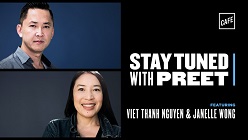By Viet Thanh Nguyen and Janelle Wong
The Asian American sense of belonging was already fragile before a White gunman killed six of us among his eight victims in Atlanta this past week. The slayings reinforce a sense of heightened vulnerability among a group that had reported nearly 3,800 incidents of anti-Asian bias over the last year. The alleged killer told police that race wasn’t a motive, but given his targets, that is just not credible. Partly, no doubt, those incidents came thanks to President Donald Trump’s insistence on calling the coronavirus the “China virus” and the “Kung flu.” Many recognized early that such words aligned him with a strain of hatred — and accompanying vigilante violence — that has existed in the United States for as long as Asian immigrants have been here.
But it’s too simple to blame Trump for what is happening. In the 1980s, officials from both parties cast Japan as the economic enemy; now it is China, one of the few issues about which Democrats and Republicans agree. And yes, it’s true that China is an extremely bad actor when it comes to espionage and human rights. But decades of official U.S. foreign policy and rhetoric from the pundit class have had a unique effect on Asian Americans. When the government frets about Russian hacking and election interference, there is little consequence for Americans of Russian heritage. When officials express fears over China or other Asian countries, Americans immediately turn to a timeworn racial script that questions the loyalty, allegiance and belonging of 20 million Asian Americans. Most Americans are not skilled at distinguishing between people of different Asian origins or ancestries, and the result is that whenever China is attacked, so are Asian Americans as a whole.
While former president Barack Obama and President Biden have both denounced anti-Asian violence, as they should, they have also spent their careers embracing critical takes on China that have overlapped with Trump’s and that may have helped accelerate Sinophobic sentiment in the United States. Trump called China a “threat to the world” and advocated a hard economic line against the country, but even Biden has vowed to continue a tough stance. This includes an initiative that civil rights groups say opens the door to the racial profiling of Chinese American scientists by giving extra scrutiny to their tax records, visa applications and other documents. Defense Secretary Lloyd Austin said this month that “China is our pacing threat.”
[In Trump’s vision, immigrants should be grateful and servile]
The news is full of paranoia about Asian Americans and Asian immigrants. Some Chinese American scientists have been wrongly charged on the assumption that they are spies. In 1999, scientist Wen Ho Lee was accused of passing nuclear secrets to China and held, often in shackles, for nine months. In the end, the judge overseeing his case freed him, complaining that he’d suffered an abuse of government power. To be sure, spies from China, like those from all major powers, operate here. But research shows that innocent Asian Americans fall under suspicion because of their race or last names. (This is the same instinct behind the racial profiling that targets Black and Brown people.) In 2014, for instance, Sherry Chen was wrongly arrested on suspicion of espionage, charged and suspended from her job as an analyst at the National Weather Service. The charges were later dropped.
While it is ever-lurking, the prominence of anti-Asian bias in U.S. life is cyclical. Though Asian Americans are often cast as a success story because of their high average levels of education and income, many Americans, at times of economic stress and uncertainty over U.S. global standing, associate Asian faces with a foreign threat. In the 1980s, alarm that Japan would corner the affordable-car market led to Asian-bashing and increased hate crimes against Asian Americans, including the murder of Chinese American Vincent Chin in 1982 by two White Detroit autoworkers who mistook him for Japanese. The supposed threat was captured by the 1993 movie “Rising Sun,” in which the Japanese villain ate sushi off the body of a naked White woman, recalling World War II propaganda that showed Japanese soldiers threatening White women with rape.
Anti-Asian bias extends beyond people of Chinese origin. Four of the six Asian women who were killed in Atlanta were of Korean origin, with the two others possibly of Chinese origin. Last March, two young children and their father were stabbed in a Sam’s Club in Midland, Tex., by a man who believed the victims, of Myanmar origin, were from China and responsible for spreading the coronavirus. Data from the Asian American Voter Survey shows that, last summer, more than half of all Asian Americans, regardless of national origin, worried about pandemic-related hate crimes, harassment and discrimination.
There is historical reason that Asian Americans feel targeted, scapegoated and vilified. In the late 1800s, the Page Act and the Chinese Exclusion Act effectively ended Chinese immigration, based on fears that these immigrants would pollute the nation with disease, immorality and foreign habits. The laws were the official expression of many years of anti-Chinese violence, including the 1871 massacre of 17 Chinese men in Los Angeles and the 1887 killing of as many as 34 Chinese miners in Deep Creek, Ore. During World War II, many Americans assumed that Japanese Americans were no different from the Japanese and therefore constituted a subversive threat; more than 120,000, many of them citizens, were interned. Thirty years later, Vietnamese refugees faced hostility, including racist attacks on Vietnamese fishermen by the Ku Klux Klan in Texas. After 9/11, heightened American fears about Muslims led to violence that targeted anybody who appeared to be Muslim, including the murder of Sikh American Balbir Singh Sodhi, a gas station owner in Mesa, Ariz., whose killer identified him as a “towel head.” In 2012, a white supremacist killed six Sikh worshipers in Oak Creek, Wis.
[Books by immigrants, foreigners and minorities don’t diminish the ‘classic’ curriculum. They enhance it.]
Meanwhile, China emerged in the 1990s to replace Japan as a future competitor the United States must beware of. The “Chinagate” controversy involved alleged efforts by Chinese operatives, supposedly at the behest of the Chinese government, to influence the Clinton administration with donations. National Review turned to yellowface to depict Bill and Hillary Clinton and Al Gore as “Manchurian candidates” with buck teeth, foreshadowing how quickly Americans might turn to anti-Chinese stereotypes under sufficient fear or pressure, as Trump did. China obviously does compete economically with the United States. But so does the European Union, which Democrats, Republicans and the press do not characterize as a threat.
...
To continue reading the full article, click the source below.






